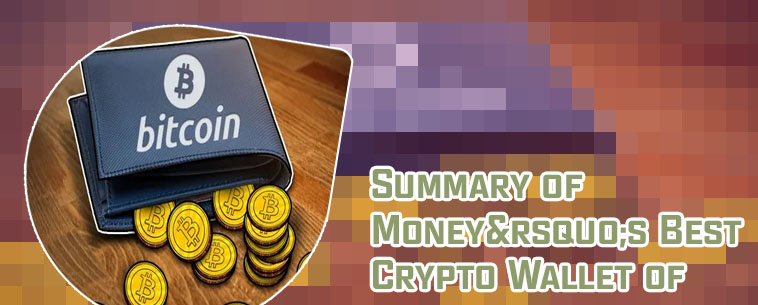Crypto wallet app

As the popularity of cryptocurrencies continues to grow, the question of whether crypto wallets will evolve next month is on many investors' minds. To shed light on this topic, we have curated a list of three insightful articles that explore the potential future developments in the world of crypto wallets. From new security features to innovative technologies, these articles offer valuable insights into what the future may hold for crypto wallets.
The Increasing Importance of Multi-Signature Wallets in Crypto Security
In the fast-evolving world of cryptocurrency, security is of utmost importance. With the rise of hacks and cyber-attacks targeting digital assets, investors are increasingly turning to multi-signature wallets as a way to protect their funds.
Multi-signature wallets, also known as multisig wallets, require multiple private keys to authorize a transaction. This added layer of security makes it significantly harder for hackers to gain access to funds, as they would need to compromise multiple keys simultaneously.
One of the key benefits of multi-signature wallets is that they can be set up with different levels of access control. For example, a company could use a 2-of-3 multisig wallet where two out of three authorized individuals are required to sign off on a transaction. This can help prevent any single person from making unauthorized transfers, reducing the risk of internal fraud.
Another advantage of multi-signature wallets is that they provide increased peace of mind for users. Knowing that their funds are protected by multiple keys can give investors added confidence in the security of their digital assets.
As the cryptocurrency market continues to grow, the need for robust security measures becomes increasingly important. Multi-signature wallets offer a viable solution for safeguarding funds in an environment where threats are constantly evolving. By incorporating multisig technology into their
Exploring the Potential Impact of Quantum Computing on Crypto Wallets
As the world of technology continues to evolve, the potential impact of quantum computing on crypto wallets is a topic of great interest and concern. Quantum computing has the ability to significantly increase processing power and speed, which could potentially pose a threat to the security of crypto wallets.
One practical use case to consider is the encryption of private keys within a crypto wallet. With the increased processing power of quantum computers, traditional encryption methods may become easier to crack, putting the security of crypto assets at risk. However, advancements in quantum-resistant cryptography are being developed to address these concerns and ensure the security of crypto wallets in the face of quantum computing advancements.
In a positive result, a crypto investor utilized a quantum-resistant crypto wallet to secure their assets. Despite the increasing threat of quantum computing, the investor was able to safeguard their private keys and successfully protect their crypto assets from potential security breaches. This positive outcome highlights the importance of staying informed and proactive in addressing the potential impact of quantum computing on crypto wallets.
Overall, it is crucial for crypto wallet users to stay informed about the potential impact of quantum computing and take necessary precautions to protect their assets. By staying ahead of technological advancements and utilizing quantum-resistant encryption methods, users can mitigate risks and ensure the security of their crypto assets in the ever-changing landscape
The Rise of Non-Custodial Wallets: What Investors Need to Know
Non-custodial wallets have been on the rise in the world of cryptocurrency, offering investors a new way to securely store their digital assets. These wallets provide users with full control over their funds, eliminating the need to trust a third party with their private keys. For investors looking to maximize security and autonomy, non-custodial wallets are becoming an increasingly popular choice.
Here are a few key points that investors should be aware of when considering non-custodial wallets:
-
Security: Non-custodial wallets offer enhanced security compared to custodial wallets, as users retain control of their private keys. This reduces the risk of hacks or theft, providing peace of mind for investors.
-
Accessibility: Non-custodial wallets are easily accessible, allowing users to manage their funds from anywhere in the world. This flexibility is particularly appealing to investors who value convenience and freedom.
-
Decentralization: By using a non-custodial wallet, investors contribute to the decentralization of the cryptocurrency ecosystem. This aligns with the ethos of many crypto enthusiasts who prioritize autonomy and independence.
-
Backup: It is crucial for investors to securely back up their private keys when using a non-custodial wallet. Losing access to these keys could result in the loss of funds, so it

- Where to buy catgirl crypto
- Where can i buy safemoon crypto
- How does btc mining work
- Dogecoin to $1
- Shiba inu coin cryptocurrency
- Coinbase crypto list
- Bit coin price in us
- Crypto com nft
- Bit price
- Coinbase cryptocurrency prices
- Shop with crypto
- Cryptocurrency app
- 270 addresses are responsible all cryptocurrency
- New crypto coins
- Where to buy crypto
- Buy bitcoin online
- How to spend bitcoin
- How to buy on cryptocom
- 1 cent crypto
- Cryptocom cards
- How much is bitcoin
- Top cryptos today
- Cryptocurrency bitcoin price
- All crypto coins
- Price of bitcoins in usd
- Ethereum price coinbase
- How much is 1eth
- How does bit coin work
- Where to buy ethereum
- Buy bitcoin uk
- Dogecoin news
- Bitcoin strength indicator
- Crypto earn interest
- The crypto
- Crypto coin wallet
- Crypto wallet app
- Usd to eth
- Where to buy bitcoin
- Cryptocurrency software
- Best crypto to buy
- Binance dogecoin usd
- Today's bitcoin cash price
- Bitcoin gas fee
- Btc miner app
- Crypto and blockchain
- Cryptocom sell to fiat wallet
- Celo crypto price
- Buy eth with btc
- Bitcoin starting price
- Ave crypto
- Buy sand crypto
- Bitcoin futures
- Bitcoin crash prediction
- Btc live price
- Apps cryptocurrency
- How to withdraw money from cryptocom
- Top cryptos
- How much is dogecoin